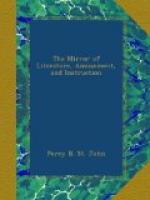Percy B. Shelley: Free as its author’s wild and beautiful poetry; but it is not the hand of a very clear or accurate thinker.
Thomas Chalmers: “We know of few more striking examples of character infusing itself into hand writing, than that presented by the autograph of Dr. Chalmers. No one who has ever heard him preach, can fail to observe, that the heavy and impressive manner in which he forms his letters is precisely similar to the straining and energetic style in which he fires off his words. There is something painfully earnest and laborious in his delivery, and a similar sensation of laborious earnestness is produced by looking at his hard pressed, though manly and distinct, signature. It is in a small space, an epitome of one of his sermons.”
A. Alison; the author of “Essays on Taste,” and other works of sound discrimination.
Washington Irving; the graceful author of the “Sketch Book,” free as a crayon drawing, with all its exquisite light and shade.
Jane Porter: a fully more masculine though less tasteful hand than Washington Irving, with whom she happens to be in juxtaposition; and the fair authoress of “Thaddeus of Warsaw,” and “the Scottish Chiefs” certainly appears to have as masculine a mind as the elegant but perhaps somewhat effeminate writer of “the Sketch Book.”
W. Tennant: “full of originality, and in this resembles his own ’Anster Fair.’ The notion may be a fanciful one, but there seems to be a sort of quiet humour in the writing, which makes its resemblance to ’Anster Fair’ still more complete. The principle upon which the letters are formed is that of making all the hair strokes heavy, and all the heavy strokes light.”
* * * * *
HALCYON DAYS.
(To the Editor.)
The following account of the origin and antiquity of Halcyon Days will, I feel convinced, prove a valuable addition to that given by your intelligent correspondent P.T.W., in No. 471 of The Mirror:—
Halcyon Days, in antiquity, implied seven days before, and as many after, the winter solstice—because the halcyon laid her eggs at this time of the year, and the weather during her incubation being, as your correspondent observes, usually calm. The phrase was afterwards employed to express any season of transient prosperity, or of brief tranquillity—the septem placidae dies of human life:
The winter solstice just elapsed; and
now
Silent the season, sad alcyone
Builds near the sleeping wave her tranquil
nest.
Eudosia.
When great Augustus made war’s
tempest cease,
His halcyon days brought forth the arts of peace.
Dryden.
The halcyon built her nest on the rocks adjacent to the brink of the ocean, or, as some maintain, on the surface of the sea itself:




